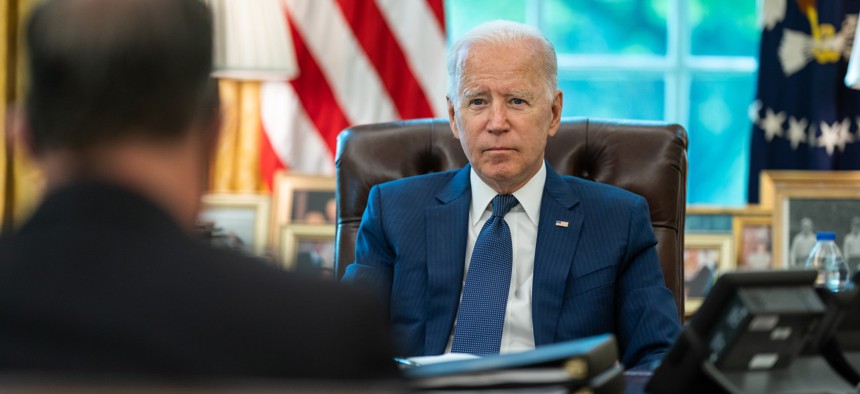
President Biden meets with White House staff in the Oval Office of the White House in August. Official White House Photo by Adam Schultz
GAO: Key Locality Pay Decisions Stalled by Lack of Biden Appointees
Although the Federal Salary Council could clear up years of disagreements that cropped up during the Trump administration, President Biden has thus far failed to appoint any members to the advisory body.
The Government Accountability Office reported Tuesday that the Biden administration is poised to make decisions on a number of issues related to how the government determines locality pay, but cannot until the president appoints members of a key advisory body.
The report, commissioned by Congress as part of the 2021 National Defense Authorization Act, serves as a summary of how locality pay works across the federal government, and highlights a number of recent controversies relating to how locality pay is administered, specifically updates to the map of metropolitan statistical areas, which traditionally have formed the basis of locality pay areas, by the Office of Management and Budget in 2018 and 2020, as well as broader questions of how the government compares federal employee compensation to their private sector counterparts.
Conservatives on the Federal Salary Council, an advisory body made up of presidential appointees and labor representatives that advise the president’s pay agent on federal employee compensation issues, pushed to include non-salary benefits like feds’ health care and retirement programs in how the government calculates the pay disparity between federal workers and their private sector counterparts.
And they entertained the notion of grafting OMB’s changes to metropolitan statistical areas onto the locality pay system wholesale, rather than the council’s traditional stance: adopt the changes where a Rest of United States location is added to a locality pay area and ignore when the changes would have removed a region from a locality pay area.
But both proposals faced harsh pushback from council members who represented federal employee groups, preventing the salary council from reaching consensus. As a result, each council member offered their own separate recommendations to the president’s pay agent, ultimately leading to the administration taking no action on either plan. In the case of examining non-salary benefits as part of federal employees’ compensation metrics, that change would require action by Congress.
The Biden administration’s approach to federal workforce issues has been largely pro-labor thus far, from increasing the pay of federal firefighters to stressing the need to encourage positive labor-management relations as part of the president’s management agenda, suggesting that the federal employee groups on the salary council could be poised to get a couple of big wins, beating back the effort to include non-salary data in compensation comparisons with the private sector—with only minor changes to how the government calculates regions’ eligibility to become locality pay areas.
But such a victory will have to wait, as 10 months into his term, President Biden has failed to appoint any members to the advisory board, GAO wrote.
“In 2021, council members told us there have been no further discussions or plans to incorporate the updates to OMB statistical area definitions from March 2020,” the report states. “Some of them noted that this discussion would resume when the new council members were appointed by the current administration.”







